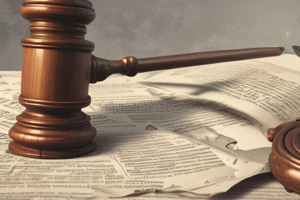Podcast
Questions and Answers
Which of the following is NOT a contextual factor that courts consider when interpreting a contract?
Which of the following is NOT a contextual factor that courts consider when interpreting a contract?
- The reasonable expectations of the parties
- The overall purpose of the contract
- The industry standards for similar contracts
- The specific wording of the contract (correct)
What is the primary reason courts consider 'industry standards' as a contextual factor in contract interpretation?
What is the primary reason courts consider 'industry standards' as a contextual factor in contract interpretation?
- To protect the interests of consumers from unethical business practices
- To ensure fairness and equality between parties of unequal bargaining power
- To provide a clear and concise definition of all contractual terms
- To establish a baseline for determining the reasonable expectations of the parties (correct)
A contract states that 'delivery will be prompt.' Which of the following factors would likely be most influential in a court interpretation of 'prompt' in this context?
A contract states that 'delivery will be prompt.' Which of the following factors would likely be most influential in a court interpretation of 'prompt' in this context?
- The cost of shipping the goods to the buyer's location
- The prevailing business practices in the relevant industry (correct)
- The urgency of the buyer's need for the goods
- The seller's capacity to produce and ship the goods
Why might the interpretation of a contract clause be different in two separate legal cases, even if the clause wording is identical?
Why might the interpretation of a contract clause be different in two separate legal cases, even if the clause wording is identical?
Which of the following statements best reflects the importance of considering contextual factors when interpreting contracts?
Which of the following statements best reflects the importance of considering contextual factors when interpreting contracts?
What principle ensures that ownership rights are clearly understood and enforceable?
What principle ensures that ownership rights are clearly understood and enforceable?
Which aspect of the principle of transparency relates to the acknowledgment of ownership in movable objects?
Which aspect of the principle of transparency relates to the acknowledgment of ownership in movable objects?
What does the term 'publicity' in the context of ownership imply?
What does the term 'publicity' in the context of ownership imply?
How does the principle of transparency affect the presumption of ownership?
How does the principle of transparency affect the presumption of ownership?
What concept may be related to transparency in ownership but is often misunderstood?
What concept may be related to transparency in ownership but is often misunderstood?
What is the primary purpose of tort law?
What is the primary purpose of tort law?
How does tort liability differ from criminal liability?
How does tort liability differ from criminal liability?
Which of the following best describes what tort law primarily addresses?
Which of the following best describes what tort law primarily addresses?
What is a significant outcome of tort law in society?
What is a significant outcome of tort law in society?
Which statement about tort law is incorrect?
Which statement about tort law is incorrect?
What defines civil liability?
What defines civil liability?
Which of the following best describes criminal liability?
Which of the following best describes criminal liability?
What is a primary aim of criminal liability?
What is a primary aim of criminal liability?
Which of the following statements about civil and criminal liability is false?
Which of the following statements about civil and criminal liability is false?
How do civil and criminal liabilities differ fundamentally?
How do civil and criminal liabilities differ fundamentally?
What does 'la possession vaut titre' imply about possession?
What does 'la possession vaut titre' imply about possession?
When a possessor is also the rightful owner, which protection should they usually choose?
When a possessor is also the rightful owner, which protection should they usually choose?
What is a key consideration in the acquisitive prescription of movables?
What is a key consideration in the acquisitive prescription of movables?
What is the primary concern for protecting the owner in property law?
What is the primary concern for protecting the owner in property law?
What distinguishes a possessor in good faith from others?
What distinguishes a possessor in good faith from others?
What does the term 'right of superficies' refer to in property law?
What does the term 'right of superficies' refer to in property law?
In which situation does A grant the right of superficies to B?
In which situation does A grant the right of superficies to B?
What is 'ius ad aedificandum'?
What is 'ius ad aedificandum'?
What does a derogation from the principle of accession imply?
What does a derogation from the principle of accession imply?
When A builds a construction on their property and grants B the right of superficies, what is this situation called?
When A builds a construction on their property and grants B the right of superficies, what is this situation called?
Flashcards
Contextual Factors
Contextual Factors
Elements that influence the interpretation of agreements in court.
Overall Context
Overall Context
The bigger picture surrounding a legal agreement or action.
Purpose of Parties
Purpose of Parties
The intentions behind the agreement made by involved parties.
Reasonable Expectations
Reasonable Expectations
Signup and view all the flashcards
Industry Standards
Industry Standards
Signup and view all the flashcards
Civil Liability
Civil Liability
Signup and view all the flashcards
Criminal Liability
Criminal Liability
Signup and view all the flashcards
Differences in Liability
Differences in Liability
Signup and view all the flashcards
Purpose of Civil Liability
Purpose of Civil Liability
Signup and view all the flashcards
Purpose of Criminal Liability
Purpose of Criminal Liability
Signup and view all the flashcards
Right Ownership
Right Ownership
Signup and view all the flashcards
Real Servitude
Real Servitude
Signup and view all the flashcards
Principle of Transparency
Principle of Transparency
Signup and view all the flashcards
Presumption of Ownership
Presumption of Ownership
Signup and view all the flashcards
Publicity in Ownership
Publicity in Ownership
Signup and view all the flashcards
Tort Law
Tort Law
Signup and view all the flashcards
Purpose of Tort Law
Purpose of Tort Law
Signup and view all the flashcards
Victim Compensation
Victim Compensation
Signup and view all the flashcards
Reckless Behavior
Reckless Behavior
Signup and view all the flashcards
Possession Protection
Possession Protection
Signup and view all the flashcards
Choice of Protections
Choice of Protections
Signup and view all the flashcards
Acquisitive Prescription
Acquisitive Prescription
Signup and view all the flashcards
Owner's Protection
Owner's Protection
Signup and view all the flashcards
Good Faith Possessor
Good Faith Possessor
Signup and view all the flashcards
Ownership Separation
Ownership Separation
Signup and view all the flashcards
Right of Superficies
Right of Superficies
Signup and view all the flashcards
Ius ad Aedificandum
Ius ad Aedificandum
Signup and view all the flashcards
Ius in Aedificato
Ius in Aedificato
Signup and view all the flashcards
Derogation from Accession
Derogation from Accession
Signup and view all the flashcards
Study Notes
Contract Law - Week 5
- This lecture covers intervening events, breach, and damages in contract law.
- Frustration is an exception to the performance rule, releasing parties from obligations due to unforeseen events.
- Breach of contract occurs when a party fails to fulfill contractual obligations.
- Frustration characteristics are rarely recognized in case law and are an extreme exception.
- Limitations include events that were reasonably foreseeable, self-induced frustration, and mere hardship.
- Force majeure is an external, unpredictable, and unavoidable event impacting performance.
- Remedies for breach target restoring non-breaching parties to their pre-contractual position. This includes legal (monetary damages) and equitable (non-monetary) solutions.
Contract Law - Week 6
- This lecture focuses on termination and interpretation of contracts.
- Termination ends a contract due to breach, non-performance, or a termination clause.
- Legal frameworks for termination exist in various jurisdictions (e.g., Article 1224, Article 1225 in French Law).
- Judicial decision can terminate a contract under certain circumstances.
- Judicial interpretation is needed when contract terms are ambiguous.
- Context, purpose, and reasonable expectations of parties inform interpretation.
- Courts may resolve ambiguities using "contra proferentem" (against the drafter).
Contract Law - Week 7
- This lecture introduces fundamental Tort law concepts and principles.
- Tort law concerns civil liability for damages, differentiating from criminal liability.
- Tort aims at compensation for victims and deterrence of reckless behavior.
- Types of liability include civil (between individuals) and criminal (between the state and individuals).
- Core concepts and frameworks of Tort law in UK, France, Germany are discussed.
Contract Law - Week 8
- This lecture focuses on tort liability requirements in UK, Germany, and France.
- Tort liability requirements involve wrongful acts, harm, and specific circumstances.
- Differences and similarities between fault, intention, and negligence are discussed.
Contract Law - Week 9
- This lecture is on strict liability, liability regardless of fault or negligence.
- Employer's liability for employee actions is a crucial aspect.
- Defenses and recourse for employers in tort cases are examined.
Contract Law - Week 10
- This week covers the basics of property law concepts.
- Property law involves entitlements to objects (property).
- Ownership encompasses both real and personal property.
- Legal systems, like French, German, Roman, and UK, have different frameworks for property law.
Contract Law - Week 11
- Continuation of property law topics from previous week, deeper analysis of different types of property rights (real, personal) and distinctions.
Contract Law - Week 12
- Continuing analysis of various aspects of property; discussion includes legal distinctions in differing property law systems.
- Common law properties and differences in rights are discussed.
Contract Law - Week 13
- This week continues the property law discussion with further details around different types of property rights and related concepts.
Contract Law - Week 14
- The lecture continued the discussion on property law with a focus on different types of rights regarding land, including land ownership.
- Land and its various rights are examined, and relevant cases.
Contract Law - Week 15
- This week examines derivative and original acquisition of property.
- It explores concepts like gifts, wills, and inheritances (testmentary dispositions).
- Types of transactions and situations involving the transfer and acquisition of specific property are highlighted.
Studying That Suits You
Use AI to generate personalized quizzes and flashcards to suit your learning preferences.




